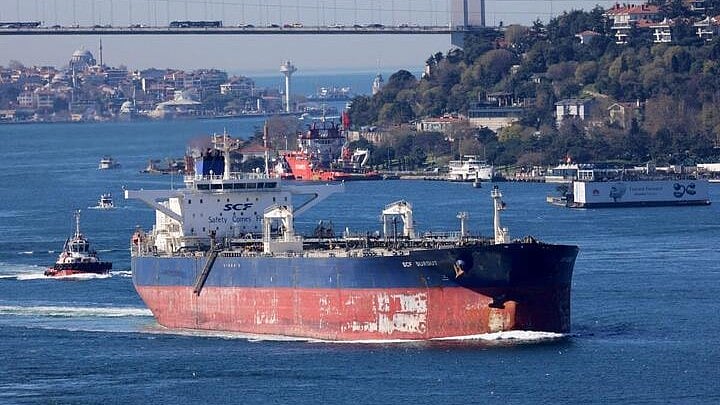
Crude oil tanker SCF Surgut, owned by Russia's leading tanker group Sovcomflot, transits Istanbul's Bosphorus.
Credit: Reuters Photo
New Delhi: The European Union’s decision to ban import of refined petroleum products made from Russian crude is likely to hit India’s exports as diesel, petrol, and jet fuel account for nearly one-fifth of the country’s outbound shipments, analysts said.
When the western countries put curbs on the direct import of Russian crude following the outbreak of the Russia-Ukraine war in 2022 India’s exports of refined petroleum products surged to the European countries. In 2023-24 India became the biggest supplier of refined fuel to the EU countries, overtaking Saudi Arabia.
Indian refiners purchased Russian crude at discounted rates. A substantial part of the refined products like diesel, petrol and aviation turbine fuel (ATF) were exported to European countries. This helped in keeping the energy prices under check in the region.
According to analysts, the EU’s new sanction would lead to a spike in energy prices in European countries.
“While the political target is Russia, the economic burden may ultimately fall on EU consumers, countries like India, and the wider global trading system,” said Global Trade Research Initiative (GTRI) founder Ajay Srivastava.
On Friday, the 27-nation European Union came out with the 18th package of sanctions targeted at weakening “Russia’s ability to wage war” against Ukraine.
The new sanctions regarding ban on import of refined petroleum products made from Russian crude has come with exception. This ban will not apply to Canada, Norway, Switzerland, the United Kingdom and the United States.
Srivastava said the EU has designed the sanctions to reshape global trade flow to its favour.
“By blocking fuel refined from Russian oil in countries like India and the UAE—while continuing imports from select Western partners—the EU is steering supply chains toward more expensive sources. This reduces competition and raises costs,” he said.
The EU has also decided to lower the price cap for Russian crude oil from $60 a barrel to $47.6 per barrel. The $60 per barrel price cap on Russian crude was imposed by the western countries in December 2022. At that time the crude oil price in the international market was substantially higher.
Petroleum Minister Hardeep Singh Puri said last week that a complete ban on Russian crude would have pushed the prices in the international markets to $130-140 per barrel.
Puri claimed that India’s decision to boost the import of Russian oil helped not only the Indian consumers but also in stabilising energy prices globally.
India exported to the EU countries refined petroleum products worth $19.2 billion in the financial year 2023-24. This declined to $15 billion in 2024-25, largely due to lower prices.
More than one-third of India’s crude oil import comes from Russia. India’s total import of crude oil was valued at $143.1 billion in 2024-25. Out of which $50.3 billion was spent on importing Russian oil. In terms of volume the share of Russian oil would be higher as it was imported at discounted rates.
The EU sanctions come back on the heels of US President Donald Trump’s announcement regarding the imposition of 100 per cent secondary tariffs on countries that purchase Russian oil.
“These actions suggest that the US and EU may be working in tandem to secure their own strategic and commercial interests—using sanctions as tools not only of foreign policy, but of economic advantage. In doing so, they are distorting global markets and undermining the principles of fair trade,” said Srivastava.
The Ministry of External Affairs has criticised the EU’s action, saying India does not subscribe to any unilateral sanction measures. “We would stress that there should be no double standards, especially when it comes to energy trade,” said External Affairs Ministry spokesperson Randhir Jaiswal.